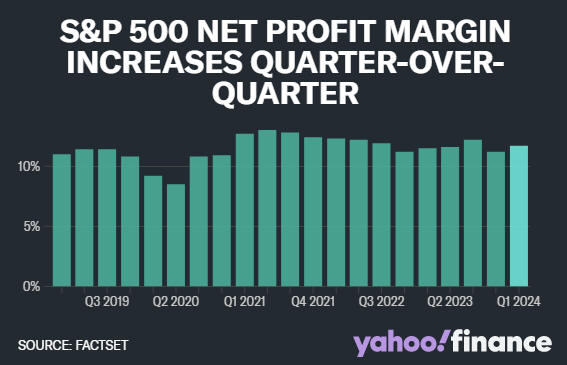Despite reports of persistent inflation and concerns that the Federal Reserve may maintain higher interest rates for longer than anticipated, stocks have largely held steady in recent weeks. Wall Street strategists attribute this resilience to a stronger-than-expected set of first-quarter earnings.
As the first-quarter U.S. earnings season nears its end, projected earnings growth for S&P 500 companies continues to rise. Overall S&P 500 earnings growth is now seen at 7.8% year-over-year, based on results from 424 of the S&P 500 companies as of Tuesday and estimates for the rest, according to LSEG.
More than 78% of companies beat Wall Street earnings expectations and among the biggest improvements in earnings growth for the quarter is the communication services group, whose first-quarter earnings have increased almost 45% year-over-year.
It is also important to mention that net profit margins are pacing for 11.7% growth in the first quarter, above the five-year average of 11.5% growth and higher than the same period a year ago. Jean Boivin, the head of the BlackRock Investment Institute, said:
“Higher interest rates usually hurt U.S. stock valuations. Instead, strong Q1 earnings have supported stocks even as high rates and lofty expectations raise the bar for what can keep markets sanguine.”

See Related: Citigroup’s First-Quarter Earnings Drop 27% On Reorganization Costs
Optimistic strategists on Wall Street contend that robust earnings growth has fueled the S&P 500 index’s approximately 9% rally this year and may propel stocks even further. Citi Bank’s equity strategy team led by Scott Chronert wrote in research this week that positive Q1 earnings results provide further support to the ongoing bullish view toward S&P 500 fundamentals, even as we navigate the Fed and underlying economic conditions.
Results are still expected from several high-profile U.S. retailers, including Walmart WMT.N, which is due to report next week but despite earnings results investors will continue to focus on remarks from several Federal Reserve officials, looking for signs of lower future interest rates. Since Fed Chair Jerome Powell hinted against rate increases and nonfarm payroll data came in softer last week, investors are gaining confidence the central bank could begin its easing cycle soon.



